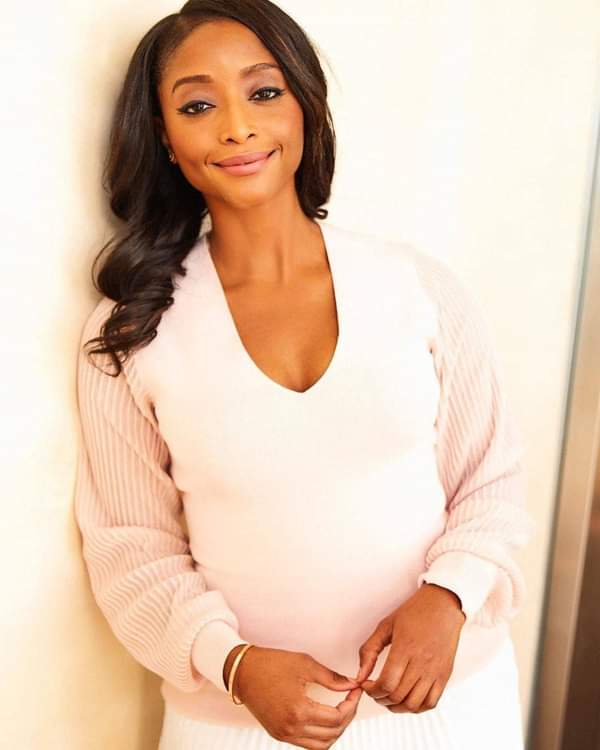Former CNN journalist Isha Sesay has on Today dot com announced pregnancy and expecting her first child at age 46. This good news she took forward and dived deep into her experiences and explained her story in an exclusive blog post by Today dot com.
The menopausal transition most often begins between ages 45 and 55. It usually lasts about seven years but can be as long as 14 years. The duration can depend on lifestyle factors such as smoking, age it begins, and race and ethnicity.
As she has longed and tried to get her most precious desire in life, being a mother for many years now, Isha has yesterday spilled the beans on the floor of her good news. Telling this her story to the world she affirmed it is to serve as a motivational story for any woman who is going what she has gone through and use her story as a reference point to never loose hope to search for your heart desires.

speaking to today dot com Isha disclosed this:
“If you’d told the 16-year-old me that at 46, I’d be divorced, single and having a baby on my own — by choice! — I’d have shuddered and firmly said “no!” Back then, I had very definite ideas about the future course my personal life would take, and it didn’t look like this. I imagined something way more straightforward and dare I say it, conventional.
I’ve been blessed to build the career of my dreams over decades as a journalist — 13 years on air for CNN International, traveling the world to cover global events and interviewing presidents, movie stars and world leaders. I published a book, became a UN Goodwill Ambassador and started a nonprofit to help empower African girls, but in my quiet moments the one thing I wanted the most, to become a mother, remained out of reach.
A brief marriage to a kind man didn’t result in children, and then the year I turned 40, my mum had a catastrophic stroke, leaving me no emotional space to contemplate anything other than caring for her. Six years went by and a few months ago I found myself in a subpar relationship with a man who took about 12 hours to reply to all my texts, among other red flags.
It was then, in the aftermath of our inevitable breakup, that it hit me: Not having a child would be the greatest regret of my life. And with my biological clock ticking down, if I was waiting for the right man to come along before I did it, well, I might just find myself out of time. So, I decided to take control of my life and settle on the bravest and scariest decision I have ever made: to have a baby on my own.
I had many long conversations with myself and tried to get to grips with questions about what it would mean to not have the support of a partner, both emotionally and financially.
How would I handle society’s questions? What would being a single parent mean for my child? I still don’t have all the answers, but I decided to take the leap because I refuse to let fear, social conventions or judgment hold me back from seeking this joy.
The process hasn’t been easy. The endless array of meetings with various doctors has also required a battery of blood tests, pelvic exams, bruising injections, nausea-inducing medication and an unexpected fibroid surgery. But perhaps most challenging of all has been the emotional dimension of this journey, especially surrounding my choice of a sperm donor.
The decision asked of me to confront questions surrounding the importance of the race, ethnicity, religion and educational background of my child’s father. Essentially, it forced me to re-examine my own upbringing, values a moral compass. Was he truly kind, empathetic, and open-minded? Ultimately, I made a decision — entirely on my own — and I have no regrets. My first IVF attempt was unsuccessful, and I cried for days afterward, before I could find the strength to start the process all over again a few months later.

But with each passing day, I grew more fearful and anxious about my chances of being able to successfully carry a child. Those feelings only intensified when my doctor decided to halt my second attempt mid-cycle because my body was responding negatively to the medication. With two failed attempts to my name, I approached my third embryo transfer with relatively low expectations.
In the two weeks that followed the procedure, my mind raced uncontrollably and I battled the urge to take an early pregnancy test. The day before I was scheduled to return to the clinic, I finally caved in and bought a home test because I couldn’t bear a repeat of the hours-long wait before the clinic called with the results.
The next morning I got up long before the sun was up, anxiously headed to my bathroom, and opened the box. The minutes ticked by and I cycled through a myriad of emotions. When the word “pregnant” flashed up on the tiny screen, I screamed and fell to my knees before bursting into tears.
Even though many weeks have gone by since then and my belly is growing larger by the day, whenever I say the words, “I am pregnant,” it is with no small measure of amazement.
I am elated, emotional, terrified, but above all thankful. My pregnancy journey is just beginning, but so far I can tell you that in addition to great joy, it has also brought unenviable amounts of nausea, fatigue, food aversions, sound sensitivity, and an ongoing battle with my hormones.
In the weeks ahead, I plan to share more of my life-changing experience in the hope that if there is anyone out there being held back from chasing their heart’s desire — no matter what it is — maybe my story will spark something in them and provide the little nudge they need to go for it.“











